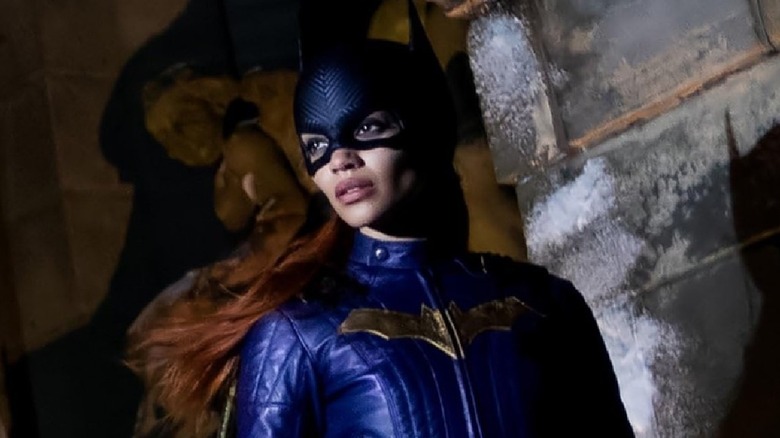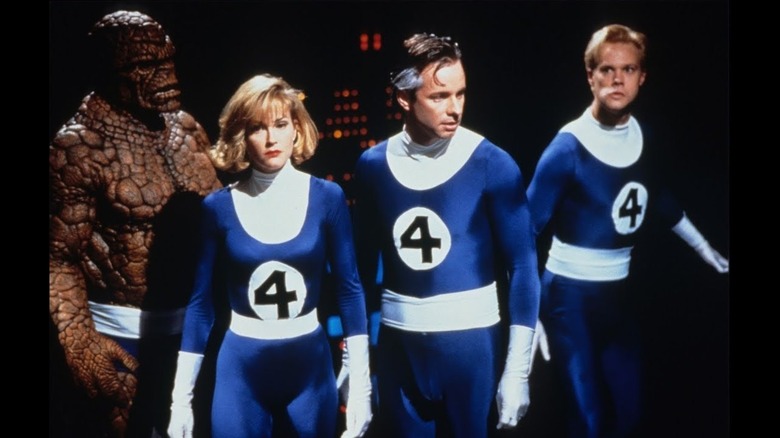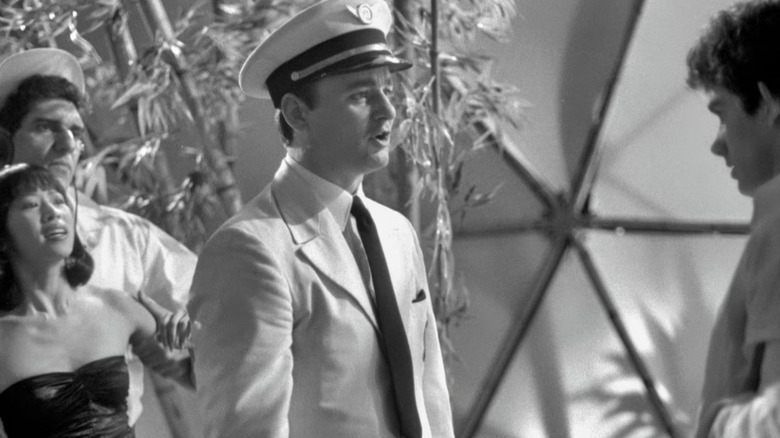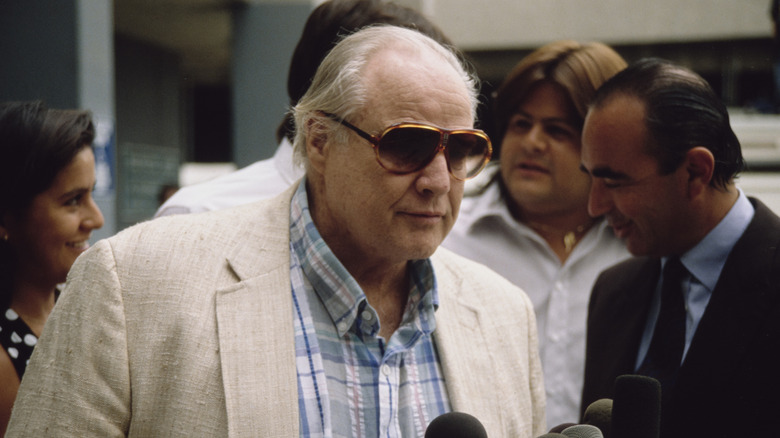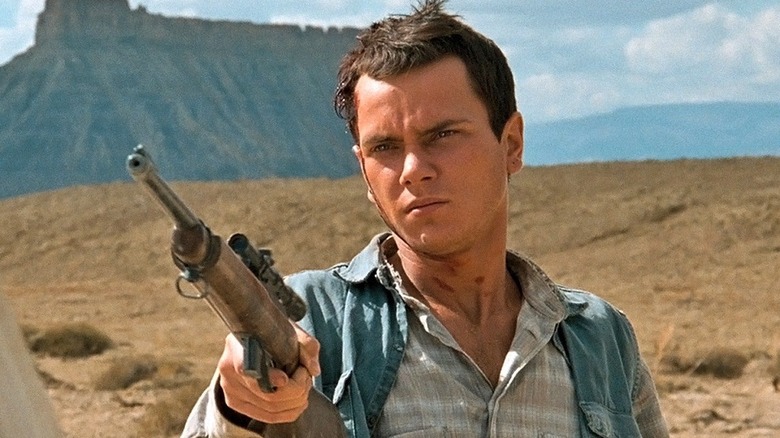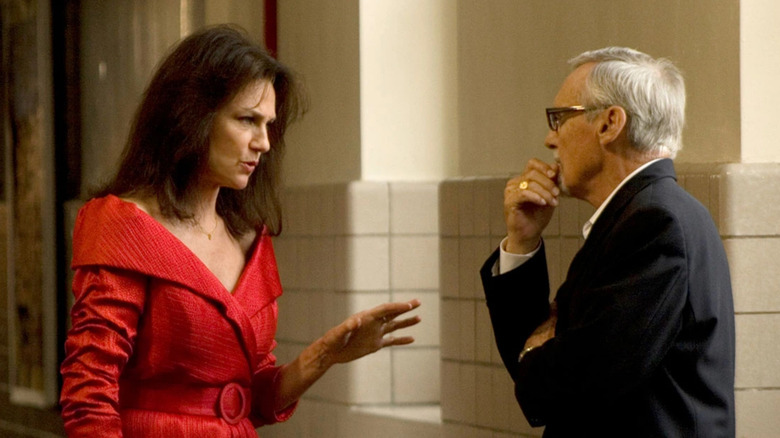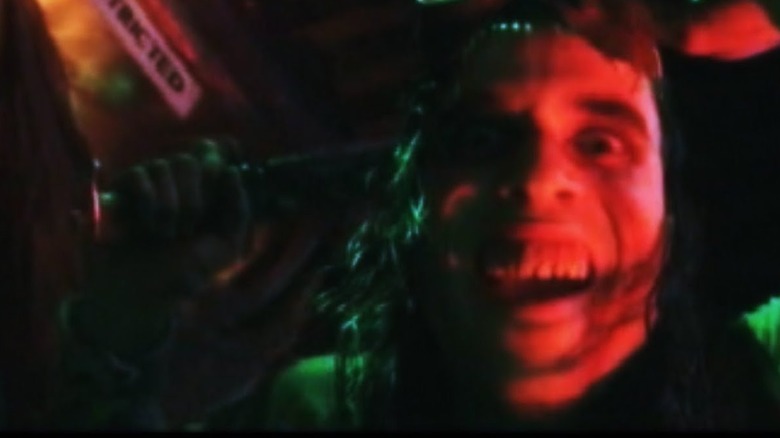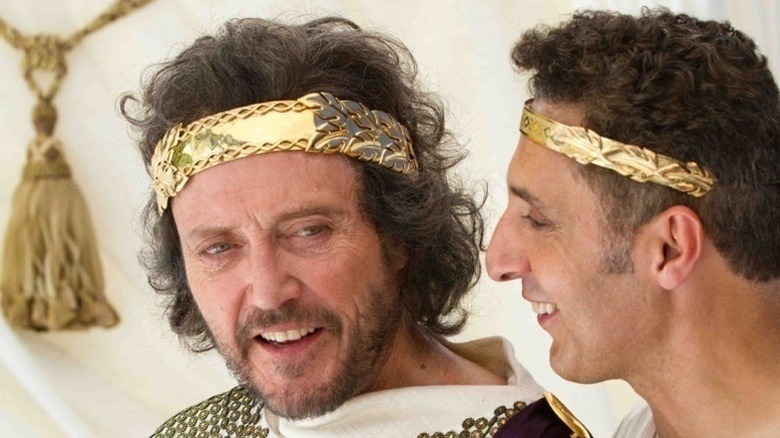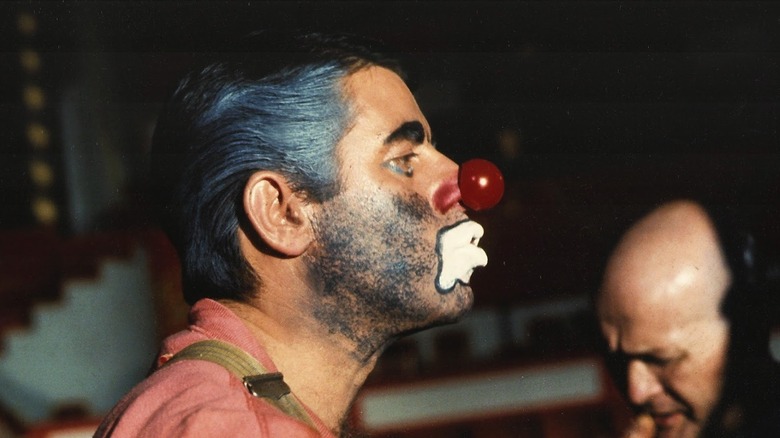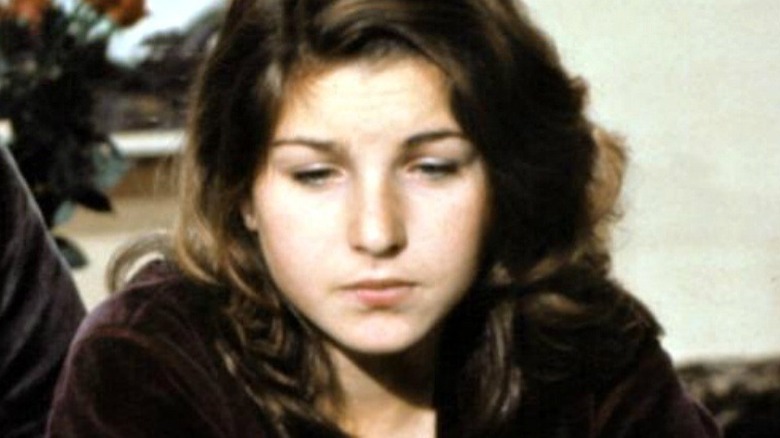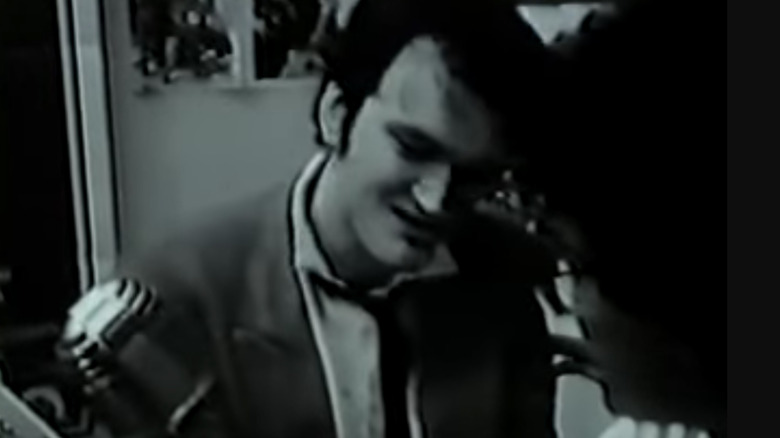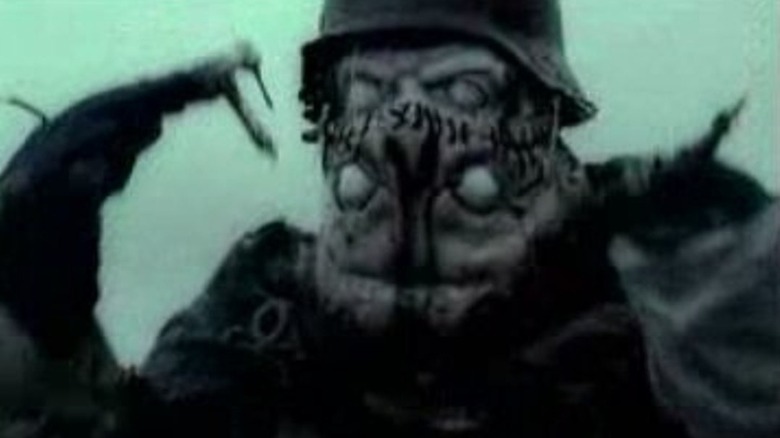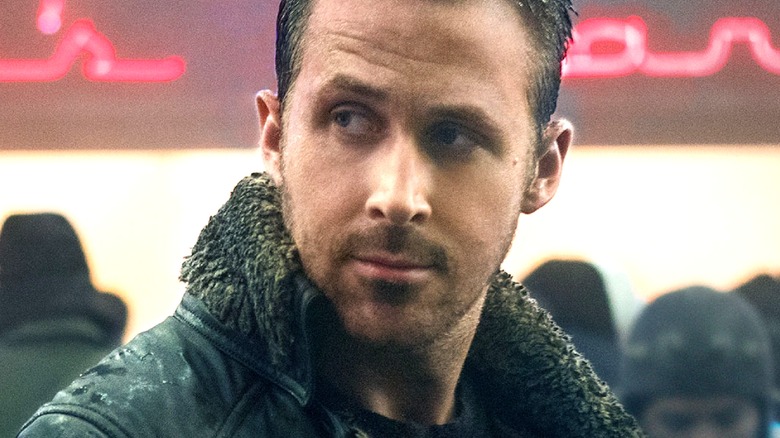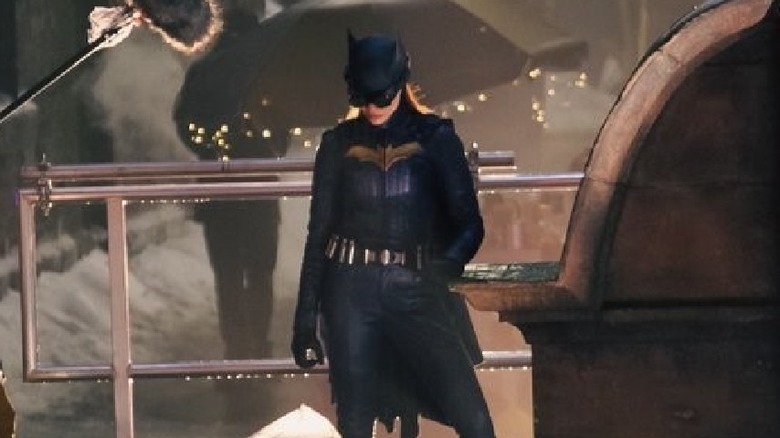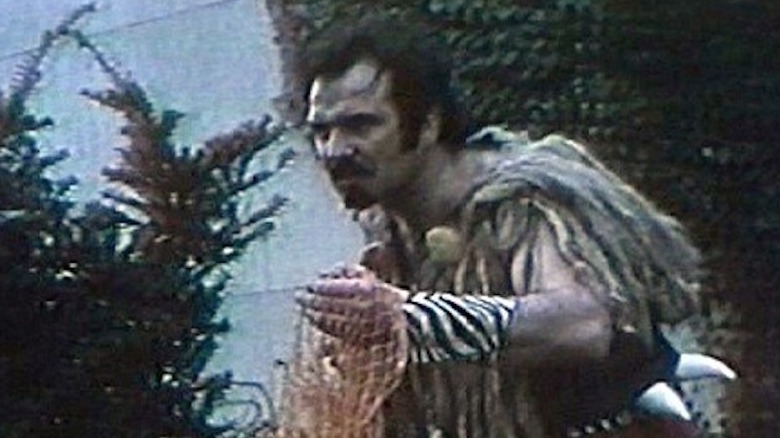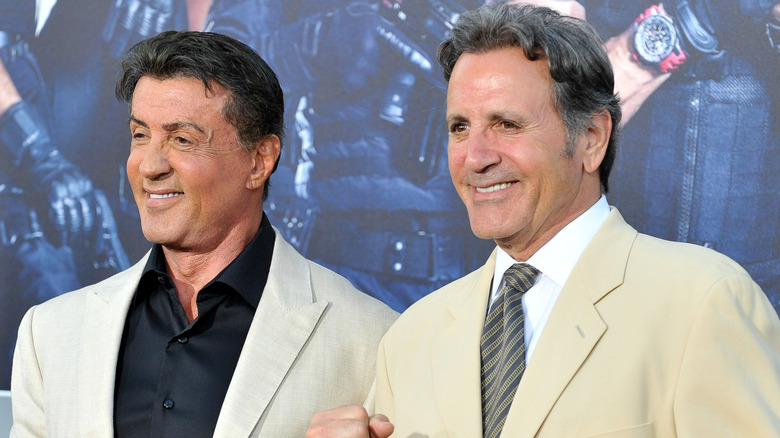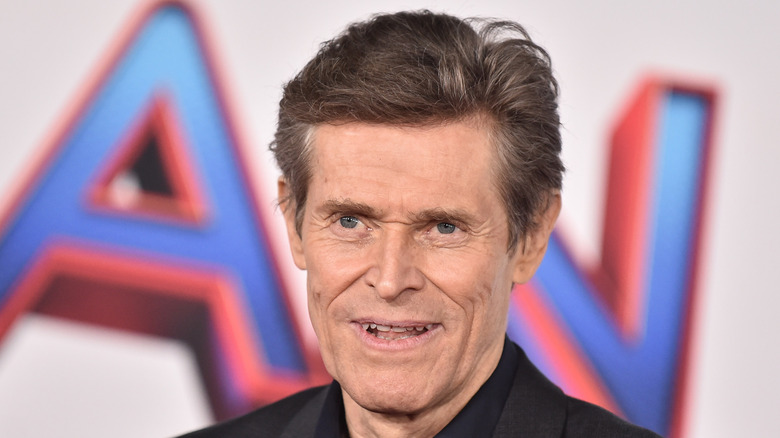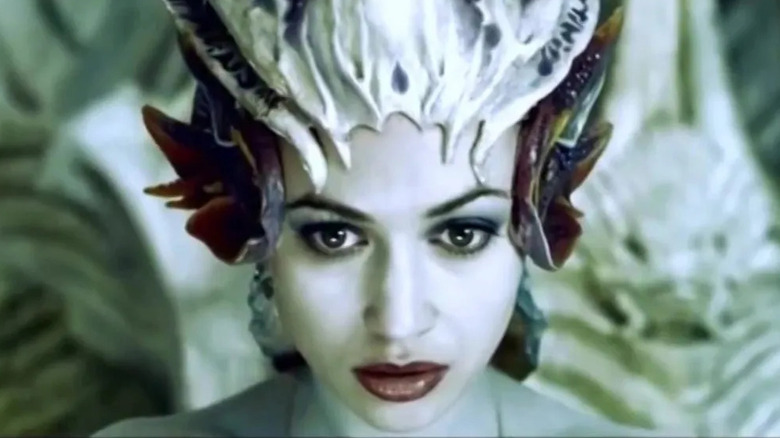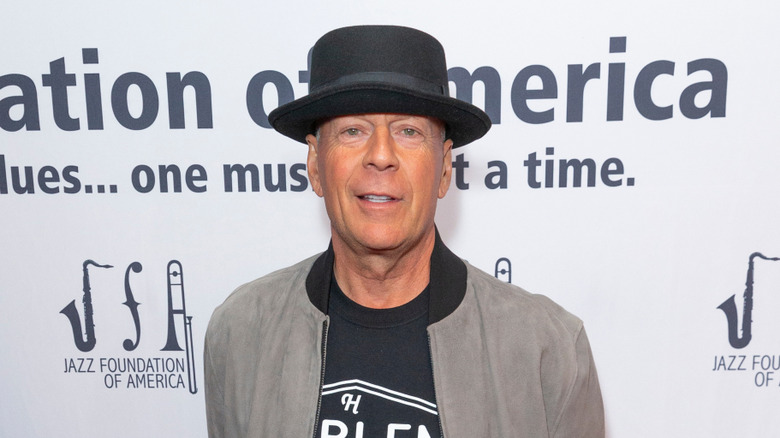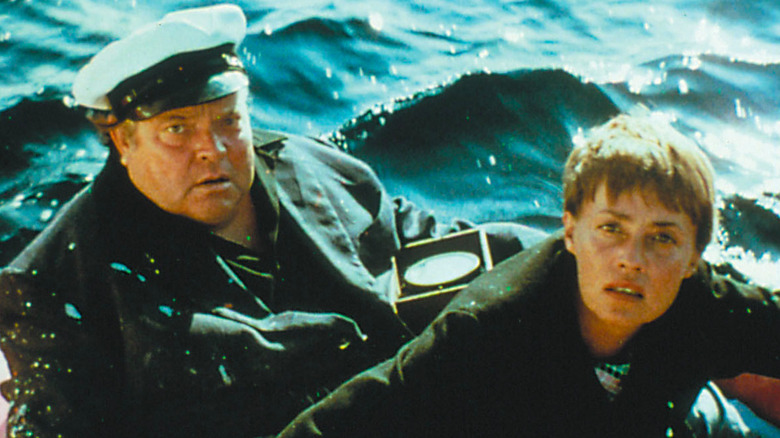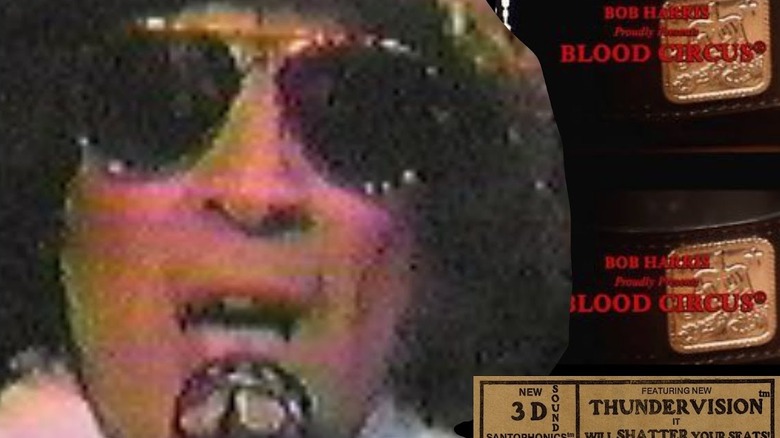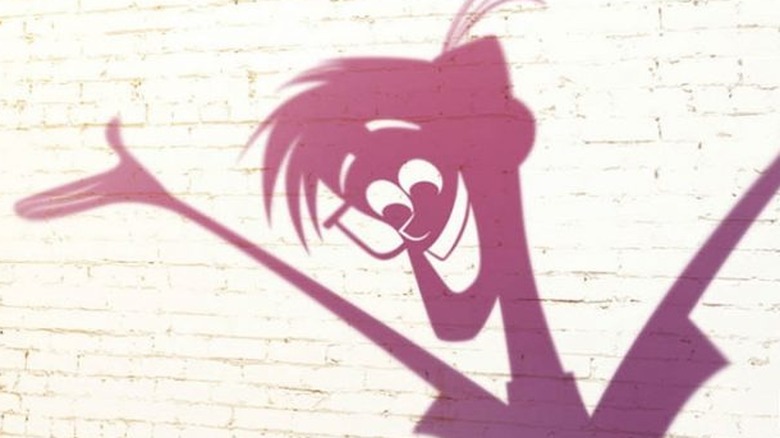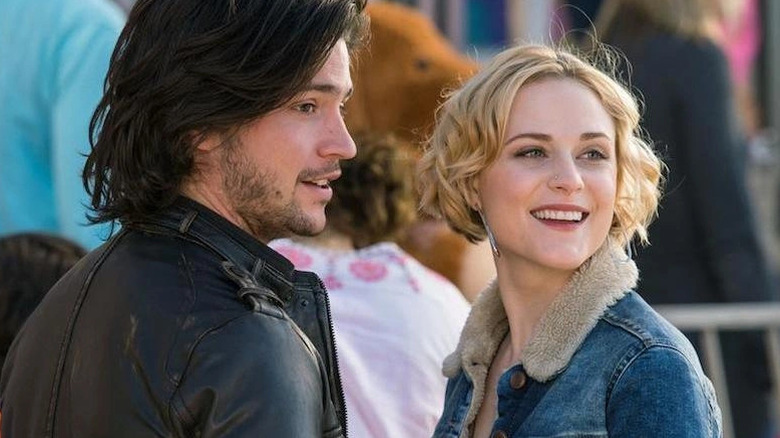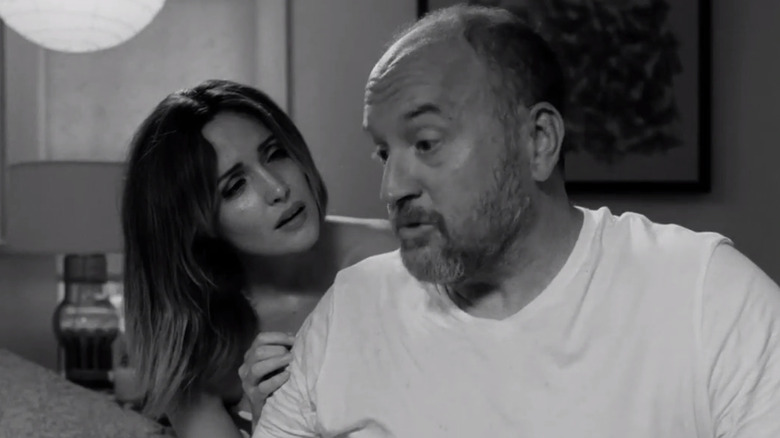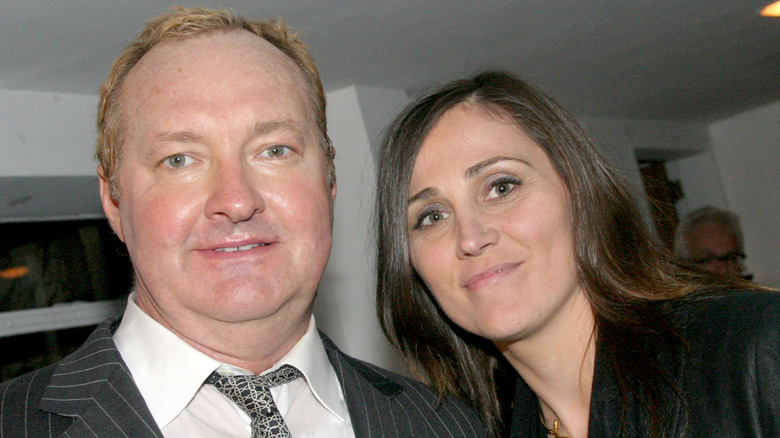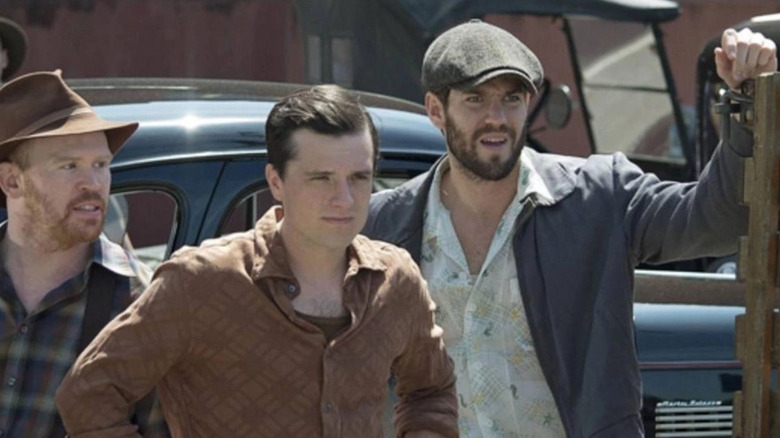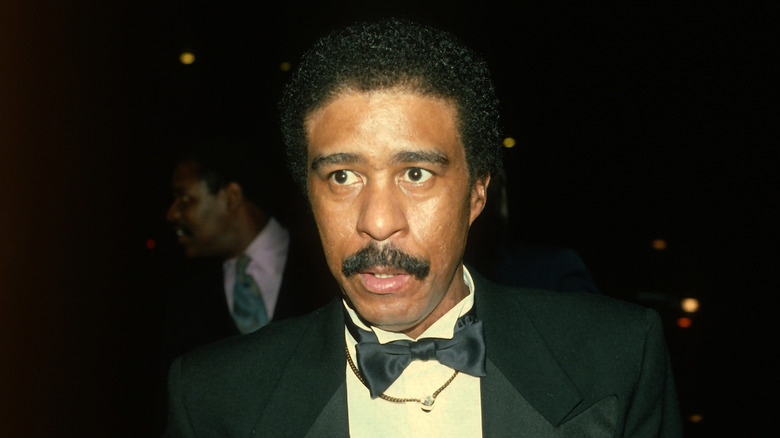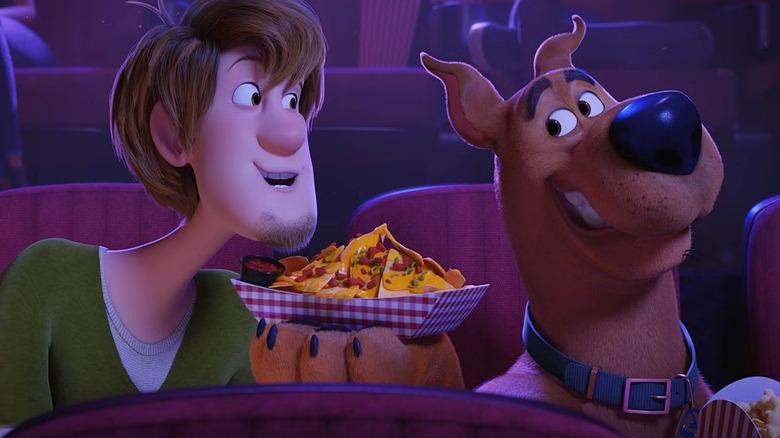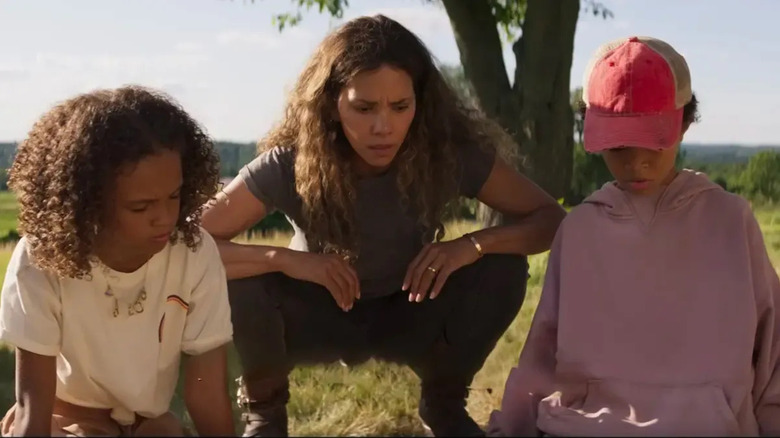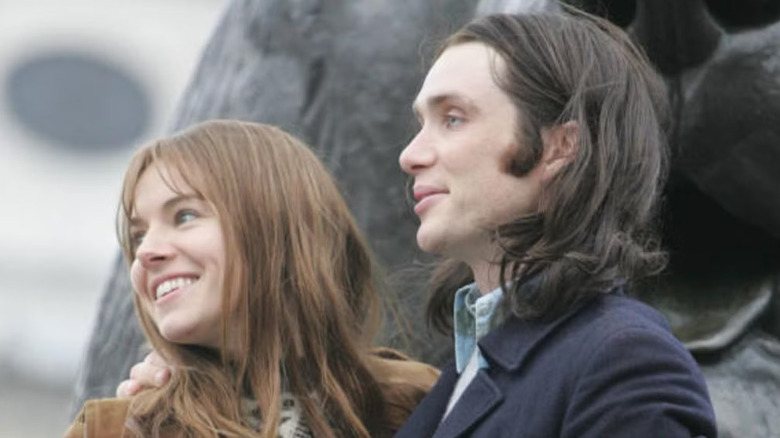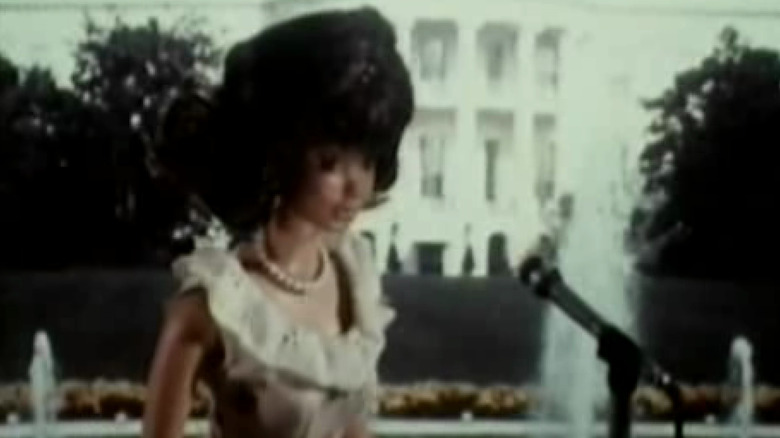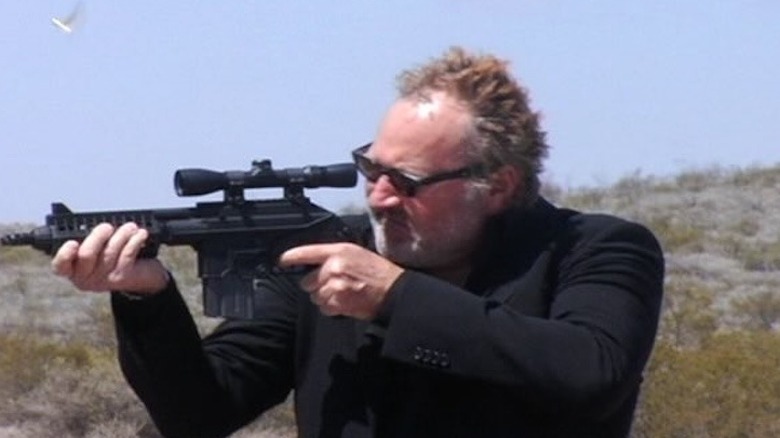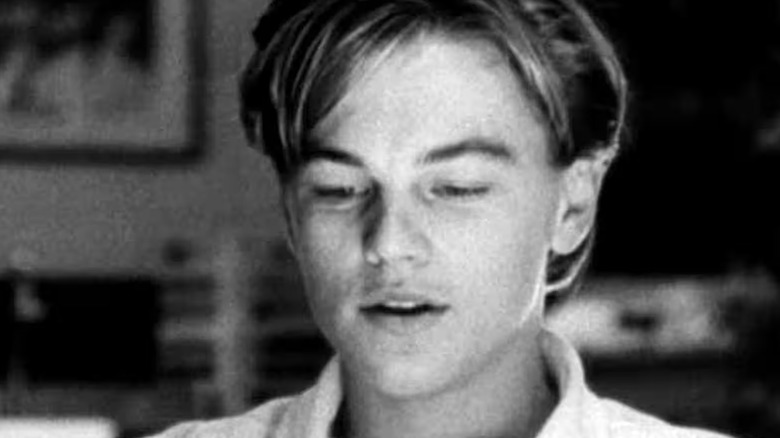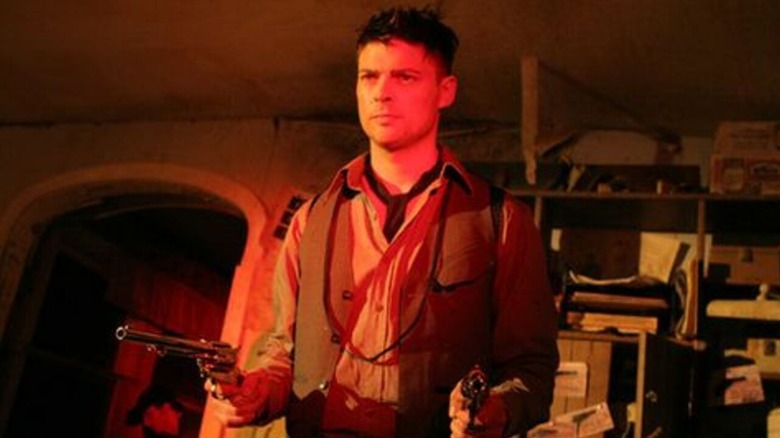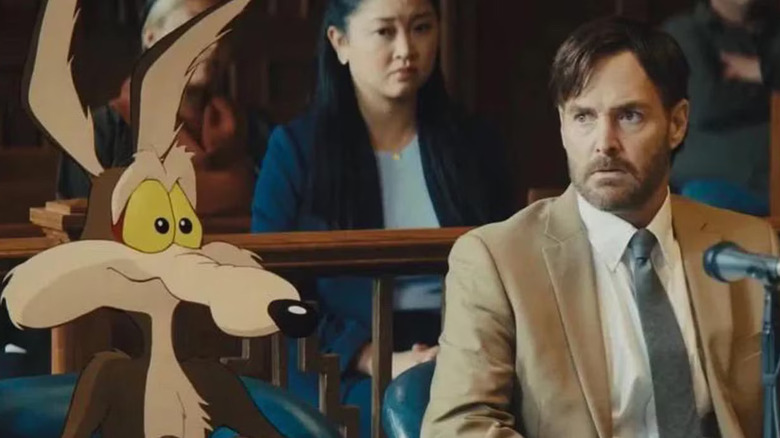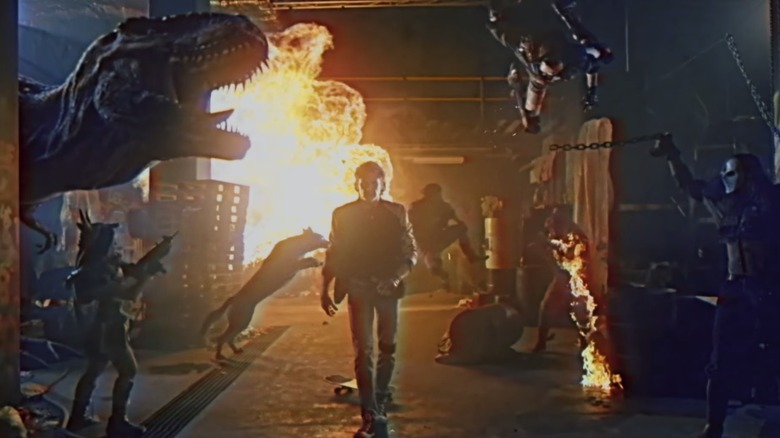Movies That Were Filmed But Never Released
There are no guarantees in show business. For all of the billions of dollars invested in making movies, there's always a chance that a film just won't break even at the box office. Even worse, sometimes things happen during post-production, or even during production itself, that result in a complete film never being released to the public at all.
It seems almost insane to think that a studio would spend all that money to get a movie going, only to pull the plug — sometimes right in the middle of shooting the thing. Studios are out a few million, actors lose a hard-earned credit on their résumé, and the world is deprived of a potential cinematic masterpiece — or perhaps a dud of epic proportions, which is sometimes why the parties involved stop the movie from going any further and burying them in an even deeper hole. Here are some films that are out there, somewhere — some completed, some abandoned halfway through — that have never been officially released to the world.
The Fantastic Four
Before a cinematic universe was even a gleam in Marvel's eye, the company raised money by selling off the film rights to some of their characters. German production company Neue Constantin bought the rights to the Fantastic Four for about $250,000 in 1983 — and then sat on them until 1992. Faced with the expiration of the agreement and needing to actually make a film in order to retain their rights, they slapped together a hasty, low-budget product in under a month ... and the results were more painful to watch than the Thing's bathroom routine.
"The Fantastic Four" got as far as showing trailers in theaters before Marvel caught on and bought back the rights to the property for a few million dollars, with the intent that all copies be destroyed in the interest of saving the publisher's brand, then still in recovery after other cinematic failures. A copy of the film leaked out, however — much to Marvel's chagrin — and quickly became one of the more legendary bootlegs to be found at any given comic con. There have been three "official" Fantastic Four movies since, all released by 20th Century Fox, with a reboot bringing Marvel's First Family into the MCU for the first time due out in 2025.
Nothing Lasts Forever
With a cast including Bill Murray, Dan Aykroyd, and Zach "Gremlins" Galligan, "Nothing Lasts Forever" is the strange brainchild of "Saturday Night Live" alum Tom Schiller, who wrote and directed the 1984 film, and the show's producer, Lorne Michaels. Because of unknown legal issues, the film never made it to either the big screen or home release, though it's appeared on German and Dutch TV, and was granted a single unceremonious airing on Turner Classic Movies.
Even the film's description makes the plot a bit difficult to understand. It takes place in a "Brazil"-like surrealist world where the Port Authority has actual authority over all of New York, underground hobos actually rule the world, and Bill Murray is a bus driver who happens to make trips to the moon. The whole thing seems too strange to exist, but if you dig long enough, you can still find yourself an unauthorized copy to enjoy.
Big Bug Man
It's strange to think that Marlon Brando's last work, "Big Bug Man," has never been seen, and stranger still to know that it was an adult animated comedy, and that it found the mighty Brando starring opposite Brendan Fraser. According to CBS News, Brando was asked to voice the role of a huge, burly, Brando-like man, but instead opted to play the part of "Mrs. Sour," an evil, droopy old lady. All of Brando's lines were recorded in his home, where the ailing thespian insisted on being dressed as an elegant woman, makeup and all.
While the finer details remain unknown, the 2006 cartoon follows a man who gains superpowers after being bitten by bugs, and his struggle against corruption as the last moral person on Earth. It's clearly not children's fare, especially considering that the movie poster depicts one character literally kissing another character's butt, but we still hope to experience Brando's last role someday — especially since he told the crew that it was the most fun he'd had since appearing in 1953's "Julius Caesar."
Dark Blood
In his last film, River Phoenix plays a man named Boy who lives in the middle of a desert. Boy becomes enamored with a married woman (Judy Davis) whose car breaks down while driving nearby. There's a kidnapping, a fight with an axe against a jealous husband (Jonathan Pryce), and a whole lot of waiting for the apocalypse.
Only a few scenes from "Dark Blood" were left unfilmed at the time of River Phoenix's death, and although director George Sluizer ("The Vanishing") managed to cobble together a final cut after years of effort, it's never been widely distributed outside of a few film festivals and a German DVD release. Before editing the film himself, Sluizer even proposed that River's brother Joaquin could stand in for the missing actor, a la Paul Walker's brothers in "Furious 7," but Joaquin refused to take part and the Phoenix family declined any involvement at all.
The Last Film Festival
A comedy about a movie so bad that it's been rejected from almost 4,000 festivals, "The Last Film Festival" is about what happens when a director finds himself in the last showing available to him and his ill-fated production. Drama and comedy — and Chris Kattan — ensue.
Dennis Hopper, who played the movie-within-a-movie's producer, had finished enough of his scenes in "The Last Film Festival" to make a complete cut, but production stopped short at the time of his death in 2010. The film's writer and director, Linda Yellen, took to Kickstarter to raise the final chunk of money she needed to complete the film. Apparently she got what she needed, because the movie was shown theatrically in Los Angeles in 2016, followed by a modest VOD release. But the last performance of the late, great "Easy Rider" and "Blue Velvet" star remains largely unknown and unseen by film fans in general.
All American Massacre
Horror fans are pretty serious about their continuity, and the complicated mess of sequels, prequels, and reboots released after Tobe Hooper's "The Texas Chain Saw Massacre" don't make it easy to follow. In 1998, the director's son, William Hooper, added his own entry to the list with "All American Massacre," a 1970s-set prequel to "The Texas Chainsaw Massacre 2" that has never been publicly released.
The film's biggest bonus is that it includes actor Bill Moseley reprising the famous role of Chop Top, Leatherface's deranged brother. It also promised to elaborate on the beginnings of the original murderous family. Years later, William turned to Kickstarter to complete post-production, but failed to secure the $8,000 funding — possibly due to the trailer that accompanied the campaign, which struck some fans as amateurish.
The film's Facebook page has gone from intermittent updates to silence, so it's possible that horror fans will never have the bloody satisfaction. Meanwhile, the franchise has rolled from studio to studio, with the latest reboot, "Texas Chainsaw Massacre," released by Netflix in 2022.
Spring Break '83
Conceived in the great tradition of terrible 1980s college frat movies, 2010's "Spring Break '83" stars a cross-section of stars from today and yesterday, including a pre-"Reacher" Alan Ritchson, Jamie Kennedy, John Goodman, Morgan Fairchild, Joe Pantoliano, and even Lee Majors from "The Six Million Dollar Man." The plot centered around a group of four friends who get their revenge after being bullied by the rest of their high school graduating class. But we'll probably never know whether the comedy relic is worthwhile, because the whole thing was shut down due to the fact that the production company wasn't paying anyone.
Even after the plug was pulled, additional filming went forward a few months later and director Mars Callahan told followers that his cut had been completed. Big Sky Pictures' website hosted dozens of production photos and even a preview of the beginning of the film, but to date, the completed production is stuck in limbo.
Gods Behaving Badly
Based on a satirical novel about gods living in New York City and kinda being jerks, "Gods Behaving Badly" features an all-star cast that includes Christopher Walken as Zeus, Sharon Stone as Aphrodite, Edie Falco as Artemis, and John Turturro as Hades. It's hard to find a reason why this film never made it past one film festival in Italy, but Variety's critic called it "remarkably feeble," also saying that it completely wasted an excellent cast.
The Hollywood Reporter went on to say that the whole thing seemed like a bad 1990s "Saturday Night Live" sketch, which was a pretty pointed insult. Some of the only things that have surfaced from this film, directed by movie producer and former The Money Store CEO Marc Turtletaub, are a bit of the campy CGI opening sequence and some pictures of Walken wearing a ridiculous curly wig and a gold headband, all probably best left unseen.
The Day the Clown Cried
The first words that come to mind when you think of Jerry Lewis aren't usually "Holocaust clown," but that's the long and short of "The Day the Clown Cried," directed by and starring the legendary comedian. The brutal narrative reportedly follows a failed German circus performer who's placed in a concentration camp and forced to escort children into a gas chamber — and it only gets darker after that.
While the film sounds like a bleak dramatic masterpiece, Lewis repeatedly vowed that it would never be seen by the public. Other sources, including Lewis' own website, complicated this further by claiming that the official rights to the original screenplay were never properly secured, making it impossible to legally release the film. Lewis did provide the Library of Congress with an incomplete version in 2015, requesting that it not be viewed for at least a decade.
A small number of Hollywood's elite have reportedly seen rough cuts of the 1972 film — including Harry Shearer, better known to most as the voice of Ned Flanders, who called the film "drastically wrong" and remarked that it's even worse than anyone could imagine.
Temptation
In 2012, the director of "Les Misérables" did something kind of new by recording the film's entire musical score live, with the actors singing on set and without any fancy studio overdubs. Critics gave the whole thing a lukewarm reception, but "Les Misérables" wasn't the first film to be produced this way. One earlier example is 2004's "Temptation" ... which we'll never get to see, even though it employed people who actually know how to sing.
Including an all-star cast of Broadway notables like Adam Pascal from "Rent," as well as future "Avatar," "Star Trek," and "Guardians of the Galaxy" star Zoe Saldana, the rock opera is reportedly a musical interpretation of the legend of Faust, mixed with a murder mystery and surrealistic animation. The film was only shown once, at a New York music festival in 2004, and its website still lingers, only hinting at the weird wonders we might one day see.
Prisoners
It must be frustrating to work for months in pre-production and on the set, just to have it go unrecognized due to what's essentially a corporate lovers' spat. But that's the way it goes sometimes and, in this case, it sounds like a real shame. 1982's "Prisoners" — not to be confused with the 2013 film of the same name starring Hugh Jackman – is about an American family that moves to New Zealand to manage a prison, only to have problems arise when the daughter (played by Tatum O'Neal) begins a secret relationship with one of the inmates.
Beyond that, details are hard to come by. Legend has it that Tatum's dad, actor Ryan O'Neal, bought the rights to prevent the movie's release, but according to the internet, the producers later said that's not true. It was a dispute between 20th Century Fox and the film's financial backers.
My Best Friend's Birthday
Quentin Tarantino is destined to be remembered and discussed for a long time to come. That makes it strange that his very first feature — the 70-minute, ultra-low-budget "My Best Friend's Birthday" — has never been released, not even for cash grab purposes. Written and shot around 1987, when the budding auteur was in his 20s, the movie follows a disc jockey as he twists himself into knots while trying to give his recently dumped buddy a birthday to remember.
Major portions of the film are considered lost, and barring some miraculous discovery, the complete movie simply doesn't exist anymore. However, the surviving 40 minutes have screened at a few film festivals and surfaced online. As much as it stings to know that Tarantino's directorial debut may never be seen again, it might be for the best: his acting performance gets pretty grating. But we bet we'll see "Kill Bill Vol. 3" before we ever get a complete version of this thing.
Worst Case Scenario
From Dutch director Richard Raaphorst, the weird foreign horror film "Worst Case Scenario" is about an army of German zombies that rises from the dead to exact revenge against England over ... a devastating soccer loss. Allegory? Maybe. But whatever its merits, it's not clear how much of this movie actually exists.
Filming began in 2004, but only a little footage saw the light of day, mostly in a couple of popular trailers. The official promo was nominated for a Golden Trailer Award in 2006, and some zombie fans dubbed it the best trailer they'd ever seen. We think that's a stretch, but it's likely that the trailer is all we'll ever see of the movie. The production was canceled in 2009, and was probably ahead of its time, since "Nazi zombies" became a bona fide hit in the 2008 video game "Call of Duty: World at War."
Blade Runner 2049: the four-hour version (2017)
While the release version of "Blade Runner 2049" sports an eye-popping runtime of two hours and 44 minutes, it's too well-paced to feel its epic length. Amazingly, the theatrical version of the movie apparently shows restraint. According to Joe Walker, the film's editor, the studio considered for a time releasing a four-hour, two-part version of the sci-fi sequel.
Speaking with Provideo Coalition, Walker revealed that the filmmakers mulled the idea of releasing a two-part "2049" while assembling a first edit, splitting the footage for the sake of convenience and accidentally stumbling onto an artistic revelation. "That break revealed something about the story — it's in two halves," Walker said. The editor described the story's structure as being about the protagonist discovering his past in the first half, and then meeting his maker in the second half. "We toyed with giving titles to each half but quickly dropped that," he added.
Director Denis Villeneuve later confirmed that a four-hour, two-part version of the sequel once existed, but that he never intended for it to be seen and that he never will release it. Unlike the original movie's director, Ridley Scott, Villeneuve doesn't see a purpose for director's cuts. "Honestly, that's the movie I made," Villeneuve said of the theatrical edit. "I will not show it to anyone, the four hours, it doesn't work. The movie you see right now is the one."
Batgirl
If there is a lesson to be gleaned from the dark history of the "Batgirl" movie, it might be that no property is safe from the whims of studios, including a proven multimedia franchise like Batman. Warner Bros. Discovery dropped $90 million on "Batgirl" and front-loaded the film with talent, including Leslie Grace as Barbara Gordon/Batgirl, J.K. Simmons as her dad, Commissioner James Gordon, future Oscar winner Brendan Fraser as the film's villain, Firefly, and Michael Keaton, who reprised his role as Bruce Wayne/Batman. With Adil El Arbi and Bilall Fallah ("Ms. Marvel") behind the camera, it seemed, at least on paper, that "Batgirl" might reverse the DCEU's fortunes.
But "Batgirl" ended up more as a casualty than a savior. Warner Bros. Discovery (WBD) — the media entity forged from the purchase of Warner Bros. by Discovery, Inc. — canceled plans to release the film to theaters or broadcast it on Max. The move was not only disappointing to fans and everyone involved but also shocking, given that "Batgirl" was still in post-production at the time of the decision. No concrete reason was given for the decision, though industry experts have pointed to several allegedly negative test screenings and the tax write-off potential for WBD to drop such an expensive project. There are currently no plans to release "Batgirl" to any platform.
Spider-Man vs. Kraven the Hunter
Sorry, Aaron Taylor-Johnson: you aren't the first live-action incarnation of Kraven the Hunter. An unnamed actor played the formidable Spider-Man foe in a fan film produced by students at New York University in 1974. The short, titled "Spider-Man versus Kraven the Hunter," was a 30-minute color film shot on 16mm by Bruce Cardozo, who would later provide visual effects for "The Avengers" and "Thor."
Cardozo's film drew on "The Amazing Spider-Man" #15, which kicked off Kraven's long run as a Spider-Man adversary; according to those who saw it, "Kraven" was faithful to the tone and look of Stan Lee and Steve Ditko's comics, and even featured extensive visual effects to allow its web-slinger (Joe Elliott) to crawl up buildings. The finished product impressed Marvel enough to earn a thumbs-up from Stan Lee and played at comic book conventions for decades.
"Kraven" won Marvel's support but not its financial backing or distribution rights. As a result, the film was only screened a few times and ultimately languished in Cardozo's personal collection until his death in 2015. Reportedly, the only known copy of the film was stored on Cardozo's computer, which was destroyed around the time of his death; currently, it exists only as a handful of screenshots.
The Good Life
Having scored several hits with low-budget martial arts films like "Bloodsport 2," siblings and producing partners Alan and Diane Mehrez set their sights on the mainstream market. They sunk $5 million into a gangster-themed comedy-drama called "The Good Life" and netted a cast of familiar faces, including Dennis Hopper, Andrew Dice Clay, mob movie vets Frank Vincent and Tony Sirico, and Frank Stallone, who also corralled his brother, Sylvester, to contribute a cameo.
But the 1997 film was in trouble from the start, and after only 15 days, union groups protesting the largely non-union crew shut the film down. The production was moved from Miami, Florida to Ixtapa, Mexico, where things only got worse: "Titanic," which was filming nearby, ate up the local resources, cast and crew were fired, and the water traps on a golf course location were reportedly filled with crocodiles.
Despite these pitfalls, the Mehrezes finished "The Good Life" and released a promotional reel that prominently featured Sylvester Stallone. This displeased the action star and his brother, who filed back-to-back lawsuits totaling $50 million against the producers. An amicable settlement was reached, but "The Good Life" never saw a theatrical release. Currently, a brief 17-second clip is available to view on YouTube,
Arrive Alive
What happens when you bring together two Oscar-nominated actors, a pair of acclaimed writers for "Saturday Night Live," and a producer whose list of credits includes everything from "Fast Times at Ridgemont High" to "Yellowstone"? The answer, surprisingly, is "disaster," as evidenced by "Arrive Alive," a 1990 comedy starring Willem Dafoe and Joan Cusack.
Produced by Art Linson and penned by "SNL" vets Michael O'Donoghue and Mitch Glazer, the film was intended as a vehicle for Bill Murray, who would have played a low-rent detective investigating a complex scheme involving a Florida Native American tribe. According to Glazer, Murray passed in part due to the film's violent content — a scene involved a killer whale biting off its trainer's head — and Dafoe took over as lead.
Three weeks after the start of production, Paramount pulled the plug on "Arrive Alive." Sources vary on the exact reason, but the studio allegedly sought to change the tone of O'Donoghue and Glazer's script by adding more slapstick elements. Dafoe was reportedly not comfortable with this broader approach, and some sources indicate that he left the production, leading to its cancellation. Others suggest that Paramount had lost faith in the project; regardless of the reason, "Arrive Alive" exists today only in script form. A YouTube video also purports to showcase three unconfirmed stills from the film.
Empires of the Deep
The thin line between passion project and vanity film was underscored by Chinese real estate mogul Jon Jiang when he attempted to funnel his vast fortune into the fantasy feature "Empires of the Deep." Conceived as part of an epic franchise like "Star Wars" or "The Lord of the Rings," Jiang sunk the equivalent of $130 million US into the film, which concerned a battle between mermaid kingdoms and a demonic warlord. He also used his funds to pull in Western industry figures like "The Empire Strikes Back" director Irvin Kershner and Italian actress Monica Bellucci.
Piles of money can buy talent but it can't make them produce under impossible circumstances, and that was exactly what the cast and crew faced on "Empires of the Deep." Language barriers, dangerous conditions, and constant, illogical script changes dictated by Jiang caused several directors and actors to quit the production, which was ultimately credited to three filmmakers, including cinematographer Jonathan Lawrence. Worst of all, a trailer was broadly mocked online for its subpar special effects and incomprehensible plot. "Empires" failed to find distribution, despite costly reshoots and a massive crowdfunding campaign. It remains unreleased, though Jiang continued to insist as late as 2016 that the film was ready for distribution.
Broadway Brawler
Hoping to rebound from a string of costly flops like "Mercury Rising" in the late 1990s, Bruce Willis signed on as both star and producer of "Broadway Brawler" in 1997. The film, intended as a sports-themed romantic comedy a la "Jerry Maguire," featured Maura Tierney as the love interest to Willis' washed-up ice hockey champ, and Oscar winner Lee Grant as director. The $28 million project, which was to be produced by Cinergi and distributed by The Walt Disney Company, had all the hallmarks of a hit.
That is until Willis pulled the plug. After 20 days of filming, Willis fired Grant, her husband, co-producer Joseph Feury, cinematographer William A. Fraker, and several others over alleged dissatisfaction with their work. Dennis Dugan, who helmed numerous Adam Sandler comedies, was brought aboard to replace Grant but lasted just a day before the project was abandoned.
To recoup their losses and keep Willis from shouldering a multi-million-dollar lawsuit from Disney, Cinergi struck a unique deal: Willis would make three movies for Disney at a fraction of his normal pay rate to cover the budget losses. Those three films — "Armageddon," "The Sixth Sense" and "The Kid" — were all box office hits, rescuing both Willis's career and Disney's bottom line. As for "Broadway Brawler," it remains unfinished and unseen.
The Deep
Though often cited as one of the greatest filmmakers in motion picture history, Orson Welles frequently struggled to complete his projects, and in many cases, failed to even get them off the ground. His uncompromising artistic vision and mercurial personality led many financiers to withhold or pull support for his work; as a result, Welles left many unfinished projects after his death in 1985. Some, like "The Other Side of the Wind," were completed by collaborators, while others, like "The Deep," exist in uncompleted form.
An adaptation of the novel "Dead Calm" by Charles Williams — which was made into a film with Nicole Kidman in 1989 — "The Deep" starred Welles, Jeanne Moreau, and Laurence Harvey as ocean voyagers drawn together by murder and deception. Intended as a commercial film to bring in a much-needed infusion of funds, Welles directed the film on a sailboat off the coast of Yugoslavia between 1966 and 1969. But financial and technical problems prevented Welles from completing production, and the death of Harvey in 1973, along with the loss of the original negative, torpedoed any chance of salvaging the film in post-production. Other than clips included in the 1995 documentary "Orson Welles: One-Man Band," "The Deep" has gone unseen for more than five decades.
Blood Circus
In the mid-1980s, late night television viewers in certain markets had their senses assaulted by a commercial for "Blood Circus," an ultra-low-budget feature film that appeared to mix professional wrestling, aliens, bargain basement gore, and a "rock singer" shrieking about gold jewelry. The TV spot wasn't a hallucination but in fact a real vanity project from Santo Victor Rigatuso, a notorious figure in the as-seen-on-TV market who created "Blood Circus" as a promotional vehicle for his Santo Gold jewelry line. Santo Gold was known to both TV audiences, through a non-stop stream of commercials, and to the federal authorities, which filed numerous cease-and-desist orders for the outlandish claims made about the jewelry (which was essentially gold-plated metal).
Rigatuso reportedly spent a fortune on "Blood Circus," but failed to land a distributor for the film (reviews that dubbed the picture incomprehensible probably didn't help). "Blood Circus" only played for a week at several theaters in Baltimore before disappearing for the better part of the next three decades, though clips are available on YouTube. However, Rigatuso, who later spent time in prison for mail fraud charges, continues to promote "Blood Circus" through his ramshackle website and even claims that the original 35mm elements have been unearthed.
Me and My Shadow
Few animated features have had an extended streak of bad luck like DreamWorks' "Me and My Shadow." The film began its convoluted existence in 2010 as a comedy-fantasy about a human who discovers that his shadow has a life of its own. Conceived as a mix of traditional hand-drawn animation and CGI, "Me and My Shadow" landed Josh Gad and Bill Hader to voice its human and shadow heroes, with Kate Hudson joining as the potential love interest of Gad's character. Initially slated for a 2013 release, "Shadow" was pushed to 2014 in order to make room for the release of "Mr. Peabody and Sherman." And that's where the troubles began.
DreamWorks co-founder Jeffrey Katzenberg reportedly expressed doubt over the film's box office potential after a 2012 screening, but the animators pressed on — until "Mr. Peabody and Sherman" flopped. DreamWorks Animation subsequently underwent a massive restructuring that saw the loss of 500 jobs and the cancellation of several animated projects, including "Shadow."
But the story didn't end there: Edgar Wright revived the project in 2015 and reportedly penned three drafts of a new script before Comcast bought Dreamworks and ordered another round of restructuring. Among the casualties: "Shadow" was canceled for the second and final time. Approximately 12 minutes of test animation and concept galleries are all that remain of the movie's tortured tenure in production.
10 Things I Hate About Life
Though its title suggests a sequel to "10 Things I Hate About You," the 2012 romantic comedy-drama "10 Things I Hate About Life" was, in fact, a stand-alone film made by some of the creatives responsible for the 1999 movie, including director Gil Junger and producer Andrew Lazar. Evan Rachel Wood and Thomas McDonnell were cast as the leads, playing two despondent types who find a reason to live in each other, while funding came in part from a pair of independent companies, the U.K.-based Intandem Films and Mad Chance Productions.
Filming began in late 2012 but was halted in early 2013, when Intandem chief Gary Smith decided to step down as the company faced financial losses. However, in conversations with industry press, Smith's replacement, Robert Mitchell, cited Evan Rachel Wood's pregnancy as the reason for the shutdown and added that production would resume in 2013.
By 2014, the only active component of "10 Things I Hate About Life" was a lawsuit filed against Wood by Intandem for breach of contract after departing the film prior to completion. Wood fired back, citing that Intandem had failed to pay her. The standoff resulted in the end of "10 Things," which exists today as a trailer and production photos. A 30-minute segment, screened for potential investors at the American Film Market in 2013, appears to have disappeared without a trace, though the original screenplay surfaced online in 2022.
I Love You, Daddy
An unabashed valentine to the New York-neurotic comedies of Woody Allen, "I Love You, Daddy" had a stellar cast led by Chloe Grace Moretz, Rose Byrne, and John Malkovich, as well as a choice debut at the 2017 Toronto International Film Festival. Distribution rights were immediately snapped up by The Orchard, which slated the film for a limited release in November before opening wide in December of that year. And then the world found out about the improprieties of its writer-director-star, comedian Louis C.K.
A pair of devastating stories in the New York Times and Hollywood Reporter, which chronicled multiple episodes of sexual misconduct, completely upended C.K.'s career, including the release of "I Love You, Daddy." The Orchard scrapped plans to release the film in November, with international distributors following suit soon after. C.K. reportedly bought back the rights to the film in 2017 and since then, has kept it out of the public eye. A pirated copy of a DVD screener found its way to torrent sites in 2019, but reports of its availability on Amazon Prime appear to be incorrect: that "I Love You, Daddy" is a kid-friendly title.
All-Star Weekend
An unlikely partnership between actors-comedians Jamie Foxx and Ken Jeong resulted in not one but two unreleased feature films. Oscar winner Foxx and "Afterparty 2" star Jeong announced an informal collaboration in 2012 that would involve each appearing in a film that the other wrote: Foxx would star in Jeong's comedy "After Prom," and Jeong would co-star in Foxx's "All-Star Weekend." Jeong's film appears to have vanished — there is no information about it after 2013 – while "All-Star Weekend" was completed in 2016 and slated for a 2018 release.
But the comedy, which stars Foxx and Jeremy Piven as NBA obsessives, is currently considered shelved for the indefinite future. That has surprised some in the industry, given the presence of A-listers like Robert Downey, Jr., Eva Longoria, and Benicio Del Toro in the cast. However, it's possible that some of the film's attempts at humor may have contributed to its status: coverage of the film noted that Downey played "a Mexican" in the film, while Foxx, who played multiple characters, appeared as a "white, racist cop."
When asked about "Weekend" by Cinemablend, Foxx said, "We're trying to break open those sensitive corners where people go back to laughing again." As Cinemablend noted, what exactly Foxx meant by "sensitive corners" is unclear, but the state of "All-Star Weekend" is, at press time, unquestionable: it's in limbo.
The Debtors
Whatever happened to Randy Quaid? He was still a beloved, Oscar-nominated character actor in 1999, approximately a decade away from his descent into the conspiracy theories and felony charges that dominated his life in the 2000s. That year, he teamed with Michael Caine and Catherine McCormick to star in "The Debtors," a comedy about individuals with addiction issues. The film earned only a handful of screenings, which generated such a negative response that the project was shelved.
Reportedly, the decision to pull the plug on "The Debtors" was rooted in a conflict between Evi Quaid and software billionaire Charles Simonyi, who invested more than $12 million into the project. Simonyi was apparently displeased with some of the film's content, including a fairly graphic sequence at a concert featuring the German industrial band Rammstein, and won an injunction against the Quaids that prevented them from releasing the film.
The couple, which invested more than $3 million of their own money in "The Debtors," were forced to declare bankruptcy, marking the beginning of their personal and professional downfalls. Though "The Debtors" has gone unseen since the injunction, the Quaids attempted to make the film available via the streaming platform DaCast. More recently, it was listed on the Indian streaming service Binged, which noted that the film is "not streaming in India."
The Long Home
Louis C.K.'s "I Love You, Daddy" isn't the only recent film to disappear due to its director's improprieties. Actor James Franco directed and co-starred in "The Long Home" in 2015, while also producing and co-starring in the drama "Goat" with Nick Jonas. "Home," which was based on the eponymous novel by William Gay, was a Southern Gothic period thriller with supernatural overtones; Franco starred as a murderous Depression-era bootlegger opposite Josh Hutcherson, Giancarlo Esposito, and Ashton Kutcher.
Production wrapped on "The Long Home" in 2015, and a 2017 release was expected after Great Media acquired the sales rights. But allegations of sexual misconduct by Franco gathered steam in the press between 2018 and 2019, culminating in a lawsuit by his former acting students that was settled in 2021. Though no clear connection to the allegations was ever established, Great Media did not release "The Long Home" in 2017 and the film remains in limbo.
Uncle Tom's Fairy Tales
Dissatisfied with his career in the late 1960s, actor-comedian Richard Pryor decided to make his own movie — one that would reflect the more socially conscious and adult tone that his stand-up comedy would take in the 1970s. Using money received as a gift after his marriage to second wife Shelley Bonus, Pryor began filming "Uncle Tom's Fairy Tales" in 1969. A surreal comedy that may (or may not) have been about an all-Black jury passing sentence on a white man for various crimes, the film, according to comedian and frequent collaborator Paul Mooney, had no script, just a notebook filled with ideas from Pryor that no one consulted.
Rampant drug use and tensions between Pryor and Bonus contributed to the film's demise. Future "Wayne's World" director Penelope Spheeris, who worked on "Uncle Tom" as an editor for two years while still a UCLA film student, said that he destroyed the completed footage in order to prove his commitment to Bonus. Spheeris reportedly reassembled the footage into a rough cut to show to comedian Bill Cosby for additional funding, which never materialized. Though the completed film is considered lost, Spheeris later found 30 minutes of unedited footage and donated it to the Academy of Motion Picture Arts and Sciences. In 2023, she reported that she was working with Pryor's widow, Jennifer Lee-Pryor, to compile all of the surviving footage.
Scoob! Holiday Haunt
A Christmas-themed prequel to "Scoob!" the 2020 feature-length animated adventure based on the "Scooby-Doo" franchise, "Scoob! Holiday Haunt" was intended for release on HBO Max (now Max) in 2022. However, it suffered the same fate that befell "Batgirl" and "Coyote vs. Acme" when Warner Bros. Discovery shelved the $40 million project, citing cost-cutting measures and a shift in focus to theatrical films instead of streaming titles.
The cancellation was particularly disheartening for Michael Kurinsky, who made his co-directorial debut on the film with Bill Haller. But despite getting the axe from Warner Bros. he and the production team finished "Scoob! Holiday Haunt," which according to Kurinsky, was approximately 95% completed before they received word of its demise. "I'm so thankful for everybody that, even though they knew this thing doesn't have a chance of coming out, they still worked like it was coming out," he told Variety. Two years after canceling "Holiday Haunt," Warner Bros. Discovery has no plans to release it in any format or on any platform.
The Mothership
Halle Berry struck a multi-year partnership with streaming colossus Netflix in 2021, which generated a pair of hits for the Oscar winner: 2021's "Bruised," which also marked Berry's debut as director, and the 2024 action-comedy-thriller "The Union" with Mark Wahlberg, which enjoyed a short reign as one of Netflix's most-watched titles in August of that year. However, these successes weren't enough to secure a release for another feature, "The Mothership," which was shelved by Netflix in 2024.
"The Mothership" was reportedly completed but still needed extensive reshoots to earn a release. Post-production delays also allegedly forced the streamer to pull the plug on the film. Berry played a woman in the film who discovers that extraterrestrials may be responsible for the disappearance of her husband. The film would have marked the directorial debut of writer Matthew Charman, who earned an Oscar nomination for co-writing Steven Spielberg's "Bridge of Spies."
Hippie Hippie Shake
While a single, definitive event often spells doom for unreleased films, the circumstances behind "Hippie Hippie Shake" seem to be both multi-layered and difficult to nail down. Working Title Film Productions oversaw the fact-based British drama about the alternative Australian magazine "Oz" and its battles with censors during the 1960s.
Pre-production began in 1998, but filming didn't actually get underway until "Elizabeth" director Shekhar Kapur joined the project in 2002. For reasons that remain unclear, production was shut down, but Working Title tried again in 2007, this time with Beeban Kidron ("Bridget Jones: The Edge of Reason") behind the camera and an impressive cast led by Cillian Murphy and Sienna Miller in front of it.
However, that version proved equally unlucky. Author Germaine Greer, portrayed in the film by model-actress Emma Booth, slammed "Shake" in an article for The Guardian; Kidron quit the film soon after, leaving it to be completed by her husband and co-writer Lee Hall. Though some preview screenings earned positive reviews, the film was shelved by Working Title and remains unreleased. Richard Neville, the real-life "Oz" editor portrayed by Murphy in the film, later said that the distributor, Universal Pictures, canceled the release in order to recoup production costs as a tax write-off.
Killing Winston Jones
In the case of "Killing Winston Jones," the initial reason for its cancellation has been superseded by subsequent problems that will, most likely, serve as the nails in its coffin lid. Actor Joel David Moore made his directorial debut on the comedy, which starred Danny Glover and Richard Dreyfuss as teachers who vie to have a school gymnasium named after them. Production on "Jones" began in 2012, with a release date announced for 2014, but the latter passed without the film reaching theaters, and it remains unreleased more than a decade later.
One possible reason for the film's disappearance was that the Savannah, Georgia-based production facility Meddin Studios declared bankruptcy in 2013 and filed a lawsuit against the "Jones" production company, Radioactive Giant, for unpaid bills, which it claimed contributed to its financial collapse. The company later suffered a second blow when "Midnight Rider," a movie about musician Gregg Allman, was canceled due to an idiot mistake that cost the life of a crew member. Meddin was then sold to the Savannah College of Art and Design. No further word about "Jones" was issued after that.
However, there's a second reason why "Jones" will probably remain dead and buried: the film's lead was "That '70s Show" star Danny Masterson, who was sentenced to 30 years in prison for rape convictions. Masterson's now-toxic reputation will most likely ward off any production entity hoping to revive "Jones."
Queen of Media
Viewers got to see a dramatized version of radio and talk show host Wendy Williams' life in the 2021 Lifetime production "Wendy Williams: The Movie." Released on the network in tandem with the documentary "Wendy Williams: What a Mess," the made-for-TV feature was actually the second of two Williams biopics, but the only one to see a release. A previous feature, "Queen of Media," was produced in 2011 and based on Williams' book "Wendy's Got the Heat." Robin Givens starred as Williams and entrepreneur Oliver "Power" Grant as her husband, Kevin Hunter.
The most likely reason for "Media" going unreleased was Williams' acrimonious 2019 divorce from Hunter, who served as producer on the film. When asked about its fate by the Los Angeles Times in 2021, Williams said, "Everything prior to divorcing [Kevin] was a [Kevin] thing. That project, I don't know what happened to it. You'll have to call him." Hunter does not appear to have publicly commented on "Queen of Media," and given Williams' current issues — she has struggled with both mental health and substance abuse problems in recent years — the film is most likely very low on her list of priorities.
Superstar: The Karen Carpenter Story
On paper, there's nothing unusual about "Superstar: The Karen Carpenter Story," which dramatizes the life and career of the singer-musician prior to her death in 1983 from complications of anorexia nervosa. The film, created by future Oscar nominee and "May December" director Todd Haynes while an MFA student at Bard College, uses Barbie dolls to portray everyone in the film, which is initially humorous but ultimately doesn't detract from its sympathetic portrait of Carpenter, whose talents helped to make her and her brother Richard major pop stars in the 1970s.
Unfortunately, Haynes never secured the rights to the many Carpenters songs that play throughout the film, which led to a lawsuit from Richard Carpenter that prevented "Superstar" from ever gaining a theatrical release. Though Richard Carpenter's lawsuit was also reportedly motivated by his depiction in the film, which paints him as both a bully and a closeted homosexual, the decision has kept "Superstar" out of circulation since 1987. It's nearly impossible to see the film in its original form — the Museum of Modern Art has a copy but cannot screen it, per an agreement with the Carpenter estate — but grainy dupes can be found all over YouTube.
Star Whackers
As previously mentioned, Randy Quaid's fall from Hollywood stardom to conspiracy theorist and fugitive from justice has been well documented; the prolific character actor and one-time Oscar and Golden Globe nominee has espoused the idea that he and wife Evi have been victimized by a mysterious cabal who target and kill celebrities. The "star whackers," as the Quaids have dubbed the group, have served as the motivation for their erratic behavior, including a flight to Canada to evade trespassing charges in the United States.
The Quaids' morbid fantasies eventually crystalized into a 2011 film, also called "Star Whackers." The actor plays both himself and virtually every other character in the film, which appears to be about the Quaids' flight from the title organization, who eventually overcome and kill Randy before he is magically revived by the final credits. That description intimates that "Star Whackers" has a linear plot, but the majority of the running time is devoted to Quaid dressed in a fur (or nothing at all) while spouting Shakespeare, wrestling with horses, and shooting guns while experiencing what appears to be a full-blown mental crisis. Aside from a few critically panned screenings, "Star Whackers" has never received an official release, though you can see the whole thing (if you dare) on the Internet Archive.
Don's Plum
It seems unlikely that a film starring Leonardo DiCaprio and Tobey Maguire would go unreleased, but that is the status of the film "Don's Plum" since 1998. A largely improvised drama about a group of 20-somethings who gather at the titular restaurant to meet women, "Plum" also featured a supporting cast of up-and-coming actors, including Kevin Connolly, Amber Benson, and Jeremy Sisto. But the clear draw was DiCaprio, then a recent Oscar nominee for "Who's Eating Gilbert Grape," and Maguire, who had graduated to leading man status in films like "The Cider House Rules."
But as actor-turned-director R. D. Robb (who played Schwartz in "A Christmas Story") discovered, neither DiCaprio nor Maguire believed that the footage would ever blossom into anything concrete. Upon discovering that "Don's Plum" was not only completed but also actively courting distributors, DiCaprio made a disparaging comment about the film in a 1996 interview, which allegedly killed off studio interest. Robb and co-producers David Stutman and Dale Wheatley sued the pair for sabotaging the release, which DiCaprio and Maguire countered with their own suit.
Both sides eventually reached a settlement which prevented "Don's Plum" from being shown in North American theaters, though it has screened in Europe. In 2016, Wheatley made the film available for streaming via a website, which was shut down by DiCaprio and Maguire over infringement issues.
Black Water Transit
The behind-the-scenes story of "Black Water Transit" is one of the more complicated cases of financial problems preventing a film from seeing release. The 2008 thriller by filmmaker Tony Kaye stars Laurence Fishburne as a New Orleans businessman corralled by the FBI to help track down a smuggler (played by Karl Urban). Problems began almost immediately when producer David Bergstein claimed that Kaye — who directed "American History X" before he was fired during filming — had delivered a cut of the film that was unreleasable. Kaye responded that legal and financial issues had left Bergstein insolvent and unable to fund the picture.
Bergstein secured funding from Aramid Entertainment to complete "Transit," but soon defaulted on the loan; the rights to the film were then sold in a foreclosure auction in 2010, but both the seller and buyer in the deal appeared to be companies owned by Bergstein. Bankruptcy forced Aramid to return the rights to "Transit" to Bergstein in 2014, but the producer was sentenced to eight years in prison for defrauding investors to the tune of more than $26 million. The sad trajectory of "Transit" ends there, with no further action toward a release.
Coyote vs. Acme
Warner Bros. Discovery canceled two feature films in 2022 — "Batgirl" and the aforementioned "Scoob! Holiday Haunt" — before killing the John Cena starrer "Coyote vs. Acme" one year after that fiasco. A live-action/animated comedy featuring the Looney Tunes character Wile E. Coyote, along with cameos by other Looney Tunes characters, "Coyote" also featured Cena and Will Forte as opposing lawyers in a legal battle between Coyote and the Acme Corporation, the company which made every device he used (all of which failed) to capture the Road Runner. Produced by James Gunn, the film was pulled from Warner's release schedule immediately after completion.
As with "Batgirl" and "Scoob!" Warner Bros. canceled the film's release in order to recoup some of its $70 million budget through a tax write-off of $30 million. The decision was met with criticism from many corners of the entertainment industry, which may have spurred Warner Bros. to offer the film for sale to other companies. Unfortunately, no studio could meet its $75-80 million price tag, and though a Warner Bros. representative told the New York Times that "Coyote" remains available for sale as of April 2024, it remains unreleased.
Gore
The Netflix feature "Gore" stars Kevin Spacey as the writer Gore Vidal and focuses on the aftermath of his 1982 loss to California governor Jerry Brown in the Democratic primary election for the U.S. Senate. Based on Jay Parini's biography "Empire of Self: A Life of Gore Vidal," the film — directed by Michael Hoffman and co-starring Michael Stuhlbarg and Griffin Dunne — was slated for release in 2018, but a 2017 interview with actor Anthony Rapp, in which he claimed that Spacey had made unwanted sexual advances toward him, resulted in Netflix pulling the plug on the film. It remains unreleased as of this writing.
Netflix issued a statement which declared that it would not move forward with the release of "Gore" due to the allegations, and additionally halted production on the series "House of Cards," for which the actor served as both lead and co-producer. The twin cancellations served as the beginning of a long period of exile from Hollywood for Spacey, from which he has yet to fully return.
Kung Fury 2
In making a feature-length sequel to "Kung Fury," a 2015 comedy short which spoofed the excesses of '80s action movies, star-director David Sandberg upped the ante by bringing aboard Michael Fassbender to star in "Kung Fury 2" as the partner of his time-traveling title supercop. It also pulled off the remarkable coup of getting not one but two '80s heroes in its cast: David Hasselhoff, who reprises his role as the car-human hybrid Hoff 9000 from "Kung Fury," and none other than Arnold Schwarzenegger. With a plot that surpassed its predecessor in terms of absurdity — Kung Fury battles both Jorma Taccone's Adolf Hitler and a new villain — it looked like "Kung Fury 2" might have been a bona fide blast. Unfortunately, it's unlikely that anyone will have a chance to see it.
The roadblock involves Creasun Entertainment USA, a Los Angeles-based production wing of the China-based Creasun Media, which became a major investor in and co-producer of "Kung Fury 2" in 2019. Creasun had agreed to fund more than half of the film's $33.4 million budget, but only paid $12 million, forcing a halt to post-production. A lawsuit filed in 2019 by the film's producers alleged that Creasun not only prevented them from finding new funding but failed to prove that they actually had enough money to complete post-production. Though "Kung Fury 2" was eventually completed in 2024, the lawsuit is unresolved and has kept the film in limbo.
If you or anyone you know has been a victim of sexual assault or needs help with addiction issues, contact the relevant resources below:
- Visit the Rape, Abuse & Incest National Network website or contact RAINN's National Helpline at 1-800-656-HOPE (4673).
- Visit the Substance Abuse and Mental Health Services Administration website or contact SAMHSA's National Helpline at 1-800-662-HELP (4357).
